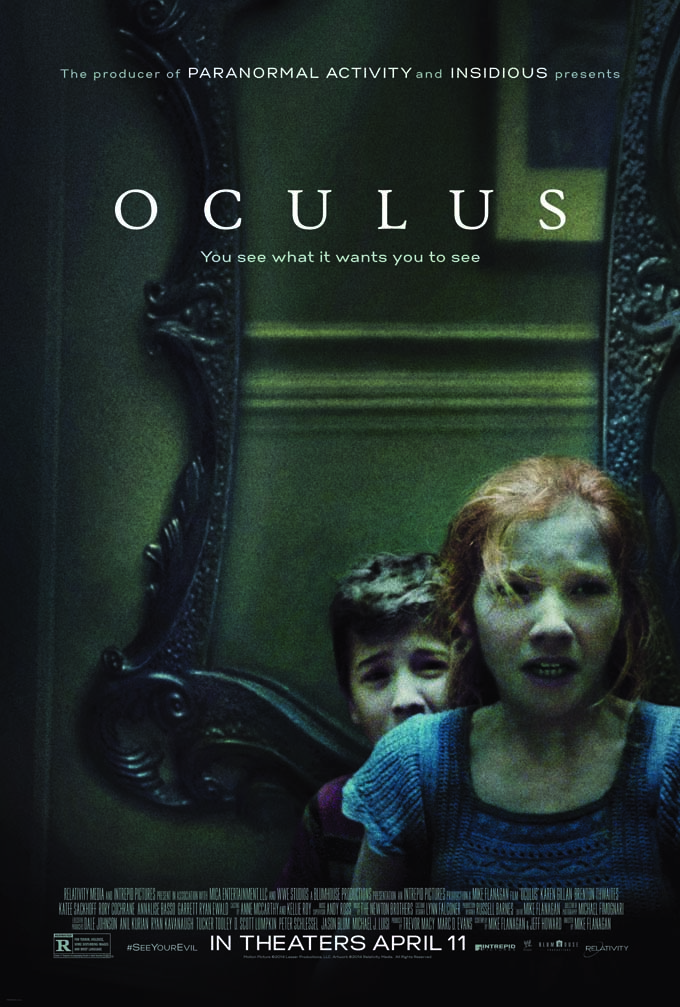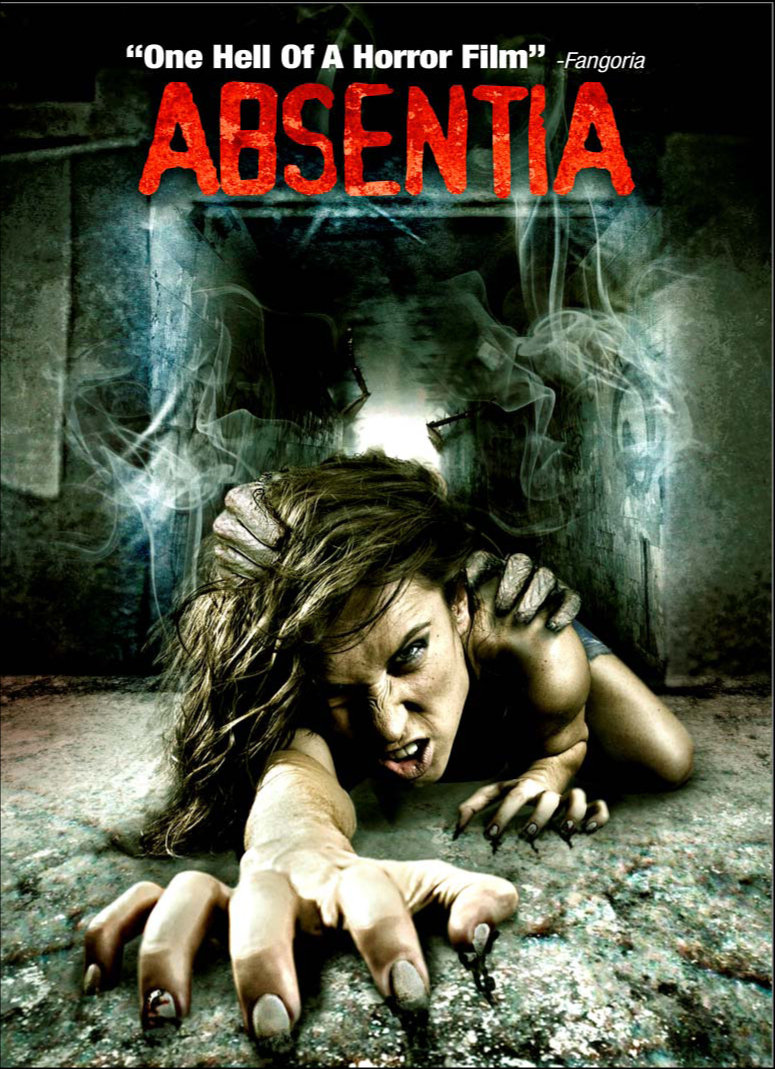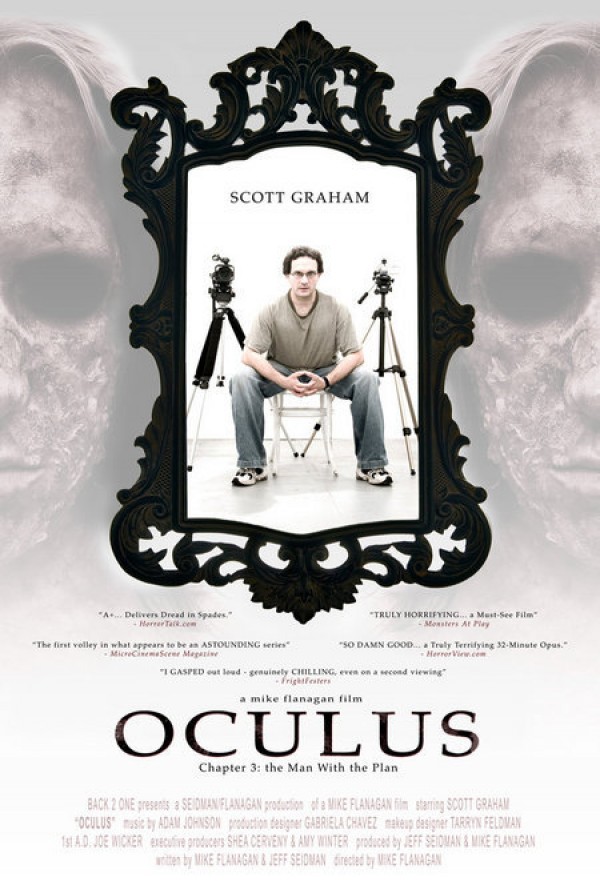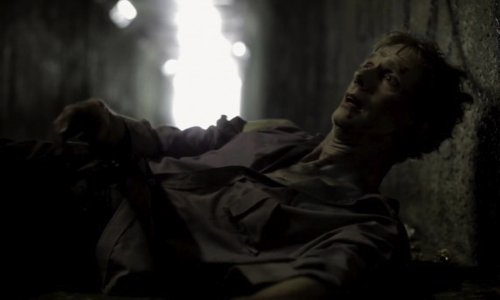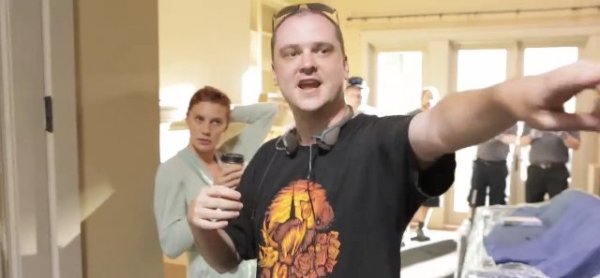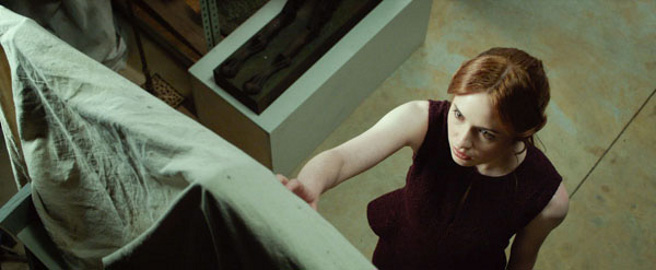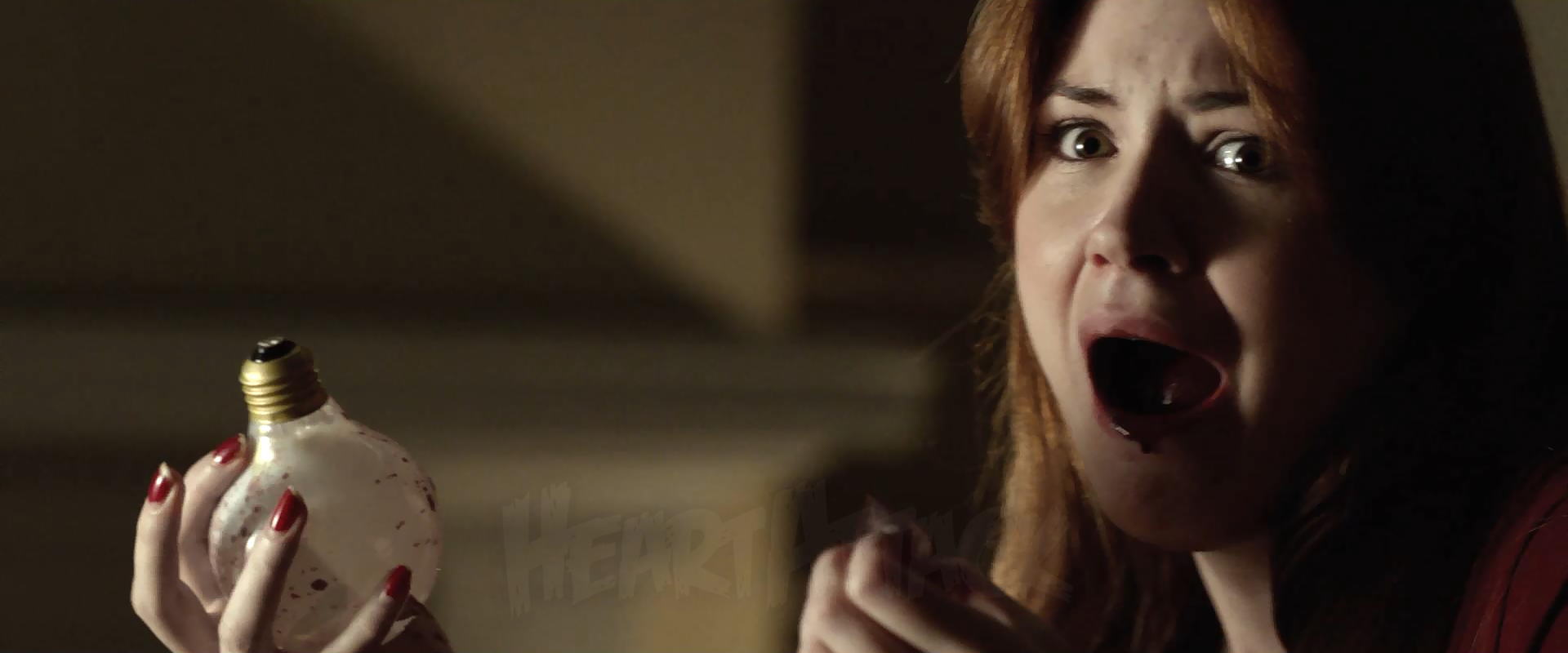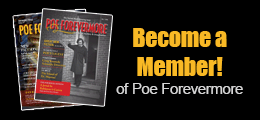Filmmaker Mike Flanagan’s new film OCULUS opened in theaters in the US on April 11, 2014.
Critics have universally praised the film, and the opening weekend box office numbers were impressive.
In 2011, I asked my friend and film editor, Sean Paul Murphy (who is also a successful screenwriter) to interview Flanagan for my magazine Monsterpalooza, marking the occasion of the release of his first horror film, ABSENTSIA. Two filmmaking friends and colleagues talking film. Here is that interview.
-Mark Redfield
|
THE MIKE FLANAGAN INTERVIEW
By Sean Paul Murphy
I first met Mike Flanagan when he was a student at my alma mater, Towson University, located outside Baltimore, Maryland. Friends of mine had told me about the talented young student filmmaker. I didn't see his first feature film, Makebelieve, but I was very impressed with the follow-up, Still Life, a drama about four photography students.
Little did I know Mike and I would soon be rivals. His third feature, Ghosts of Hamilton Street, and my first feature, 21 Eyes, hit the festival circuit at the same time and we ended up playing at some of the same film festivals. I found Ghosts of Hamilton Street fresh and intriguing and I watched it every chance I got. I was even more impressed by his subsequent films, the short, Oculus, and the new feature we are discussing here, Absentia.
Mike, before we get to Absentia, tell me what kind of films excite you? What are your influences as a filmmaker?
I'm excited by all kinds of films, and I always have been. When I was a kid I obsessively watched Jaws — I've probably seen it several hundred times. I gravitated toward art film in college, and remain a deep lover of filmmakers like Terence Malick. Lately I tend to gravitate toward foreign films, particularly Korean and German cinema. As a kid I was really frightened by horror films and tended to avoid them, but now they're some of my favorite things to watch.
Some of my major influences don't come from movies, but from books. I own every single book Stephen King has ever written, and find such powerful influences in the stories of H.P. Lovecraft and Edgar Allan Poe. What amazes me about those books is that they can be enjoyed by people who otherwise claim to "not like horror."
Many young filmmakers make horror films because they can be done cheaply and they are easier to get distributed. However, your work shows a love for the horror and fantasy genre. What attracts you to it?
I think that the purpose of cinema is to evoke emotions, and fear is one of the most potent and immediate emotions movies can draw out of a viewer. I hated being scared as a child, but love it now.
Fear is a universal emotion. Different cultures have different ideas of love, of sex, of success, of honor ... but being scared is truly universal. We all know what it is to fear the dark; it's the first thing we all have in common and is one of the most intense experiences that each of us must face in our early life. That's why horror can connect with audiences regardless of their culture, regardless of the language.
To then take that basic fear, and the conventions of a genre that allows you to dabble outside of reality, and use those tools to discuss deeper issues about the human experience, is amazing to me. I'm thinking specifically of filmmakers like Romero, who used Night of the Living Dead to create some great scares, of course, but also to discuss racism. And Dawn of the Dead, which is as much a meditation on consumerism as it is a horror film. What a fantastic formula — use a universal emotion to engage a massive audience, including teenagers and viewers who would roll their eyes at your message if you presented it straight, and then create a platform to make us all look deep at our own natures... and people dismiss this genre as somehow being incapable of being art!
|
Mike, although Absentia is your first major release, you have made a series of intriguing independent films over the years. I was particularly impressed with Ghosts of Hamilton Street, that, like Absentia, toyed with the idea of alternate reality. In Ghosts of Hamilton Street, the protagonist finds people disappearing from his life in the reverse order to which he met them and no one else remembers them at all. Could you tell us about that film?
Ghosts was my third independent feature, and falls more in line with science fiction and The Twilight Zone than with horror. It was the first of my films that didn't follow a straight dramatic story structure. It was my first genre film, in essence. I was pretty pleased with the movie in general, though I still think it represents the work I was doing before I really discovered my voice as a writer.
Do you see any parallels between Ghosts of Hamilton Street and Absentia?
Absolutely. Both are films about people who disappear, and how their absence is processed by those who remain. Ghosts deals with this in a sensitive way, opting for discussion and maybe a bit of melodrama, taking the concept very seriously and striving to make the audience do the same. Absentia, on the other hand, deals with a lot of the same ideas, but does so as a horror film. The themes are more subtle.
The themes of losing loved ones, particularly without explanation, and the immediate and dramatic changes that occur in the lives of those left behind, are central to both movies. One is a drama, one is horror.
You also made a genuinely scary short film about a man obsessed with an evil mirror called Oculus. The film was quite a hit on the horror film festival circuit. Could you tell us about it?
|
Oculus is really my most effective calling card. It was the first time I got out of my own head enough to try to make a true genre film, putting aside my tendencies to use my movies as a way of working out emotional issues and instead just trying to scare people. It was immediately my most successful film. It was full of challenges — we had no money whatsoever, and the entire movie takes place in a single, bright room. There is only one actor on screen (Scott Graham), and he's sharing his scenes with a mirror. Logistically it was a nightmare, but the challenge of creating something frightening with no real ingredients to speak of made for some of the most exciting problem-solving I've ever had to undertake.
Overall, do you think it helps a budding writer/director to make short films? Do they give you more credibility in the industry?
They're beneficial for a number of reasons. First, you don't have to spend as much money, and that's huge. As a practice ground, which most indie films end up being, it's way better to spend less. Second, sad as it makes me to say it, industry professionals (agents, managers, studio execs) tend to be overwhelmed with material, and the odds of getting someone to watch a 15 minute short are WAY higher than getting them to look at your feature. Sure, you can't really SELL a short film, but a great short accompanied by a killer feature-length script is a combination that tends to get people hired to direct on a different level.
Can you describe the genesis of Absentia? How did the idea develop in your mind?
Making movies has a lot in common with drug addiction. Once you get hooked, you need a fix every so often. It'd been a long time since I'd actually shot anything - five years, in fact, which is the longest I've gone since my first short film projects in 1996. I was just jonesing to get back to production, and I knew I wanted to make a horror feature.
The rest happened kind of backward. I've lived across the street from the creepy tunnel featured in the film for the last five years, and always thought it would make a great location for a horror movie. I didn't know what that movie was, though. I also have a lot of friends who are struggling to make it as actors in LA, including Katie Parker, Courtney Bell, Morgan Brown, Dave Levine, and Justin Gordon. I wanted to make a movie that would benefit us all.
So I knew the location and the cast before I knew the story, and I knew I wouldn't have any money to speak of. It was "written to scale," as they say, because those limitations meant far less options from a writing point of view. We'd shoot in my apartment, with those actors, and use the tunnel. That was really all I had to go on at first. It was my younger brother James who proposed The Billy Goats Gruff as a possible inspiration, and the mental image of a MISSING PERSONS poster in front of that tunnel really lit the fuse from there on out.
You seemed to be building some career momentum with your previous films. Did you try to make Absentia within the "studio system," or did you always intend to produce it yourself independently?
It was always intended to be independent. In fact, it was never pitched to a single company. I've been peddling spec scripts in LA for years and have been certainly making progress on that end, but I knew it wasn't realistic to present myself to studios as a legitimate director without a successful feature under my belt. This was intended to change that, and thankfully has.
Mike, you raised money though Kickstarter. What did you think of that process, and do you think you would have been able to make the film without it?
We raised about a third of our budget through Kickstarter. I was initially very skeptical of the site, and while we were very successful, it took a ton of work to get it there. Sites like Kickstarter are a great tool for smaller projects and creative ventures, but people assume that listing the project on the site will somehow lead to getting it funded. That's absolutely not true. It's a full-time job, and means exhausting your social network. We produced short films every three days for our month-long "pledge drive", and that was almost as exhausting as making the actual movie.
How did you get the script to Doug Jones, and what made him come aboard on the film?
I've always been a fan of Doug Jones, and we were able to get in touch with Doug because our DP had worked with him on another project and was able to email him directly. But Doug is very approachable — if you go to his website, he encourages indie filmmakers to get in touch and tries to read everything that is submitted to him. He's very vocal about filmmakers not being afraid to approach the talent they want — if the actors are available and like the project, they'll often do it.
|
He read the script and responded very positively to it. It also helped that we were only asking for one day of his time. It all boiled down to a face to face coffee meeting, wherein he made it clear he'd be sizing me up to see if he felt like he was in good directorial hands. I was utterly terrified, which is funny now that I know Doug better. He's about as intimidating in person as Grover [from Sesame Street.] The guy is just lovely, he might be the sweetest man I've ever met. Our coffee meeting turned into a three hour rap session and at the end he committed to the project, and to anything else that I'd do in the future. I plan to take him up on that!
One thing I found particularly refreshing about Absentia was the dialogue and relationships. This is one of the rare horror films I have seen where the story and relationships are inherently interesting enough that it would have sustained my interested without the horror elements. Did you ever conceive of the story as a simple drama?
It was important from the beginning that the story be able to function without the horror elements. That's become a major requirement for me with any project. We took great care to make sure the relationship between the sisters would drive the story.
The dialogue between the two sisters seems very fresh and naturalistic. Was it all on the page or did you allow the actresses the freedom to improvise?
It's a mixture of both. It's very, very close to what is on the page, but I can't take all the credit for that. Katie and Courtney have a very sisterly relationship in real life, and I had their voices and rhythms in mind while writing. While they didn't do much improv, there are several moments that were indeed ad-libbed and I think give the scripted words that precede them the illusion of being just as spontaneous.
More than the words themselves, I believe it is the rhythm of their speech that gives it that feeling. I was careful not to finish thoughts or sentences on the page, as people rarely do in familiar conversation and are prone to interrupt and finish thoughts for each other, if finishing a thought is even necessary. Siblings have a way of finishing each other's thoughts in their heads, and spoken sentences tend to cease at the point they're both on the same page internally.
We tried to allow them to share the screen as much as possible, especially early on in the film, so that they could find that rhythm themselves. Later, and when we featured them in more close-ups, a lot of that rhythm was created in the edit, but by then the actresses had really figured out how to create the illusion of that overlapping, overly familiar conversation style with each other.
You wore a lot of hats during the making of Absentia. What roles did you enjoy most and least?
|
I have a hard time differentiating writing, directing, and editing. While the mechanics are different, the process is the same for me in each phase — it's just about picturing the movie in your mind, and trying to make reality match that mental image as well as possible. In the screenwriting phase it's easier, because you're not limited. You can write anything on a page. Directing is more difficult because you have less options, and have to make it all work with what is in front of you. But, you're collaborating with actors and crew members at that time so you're really supported, and it's really exciting to discover what this team of people will bring to the project that you never considered. In the edit, your options have been whittled down to the fewest they'll ever be, but it's the first time you really see it all taking shape, so that's where I find it to be the most rewarding.
But since those are all just phases of the same process for me, I don't prefer one over the other at all. Editing is at once my favorite part, because I get to see it all come together, and my least favorite part, because I can only work with what I have. The chances to do things differently, or to get that one last element that would make it truly amazing, have pretty much already passed.
My least favorite part of this film, though, was my role as a Producer. The logistical and business-oriented aspects of filmmaking aren't my favorite, and I found that they provided me with more frustration than any other aspect of making this film. I hate paperwork, I hate negotiations, and I really dislike diverting energy away from the creative process to handle logistical matters. Luckily I was one of four producers, and they were on top of just about everything they could be.
Absentia is one of the rare low-budget films that doesn't seem to suffer from a lack of funds. If you had unlimited funds, want would you have done differently?
Very little, actually, and I think that's why it worked out. I doubt we'd show much more in the way of visual effects, and the story was always one that felt best told in the contained, small scale that we told it in. Unlimited funds would mean better cameras, a bigger crew, and more importantly more time to shoot, which I think would have afforded our actors more opportunities to nail a take and could have yielded any number of beneficial surprises. But ultimately, the things that made the film successful — the story, the performances, and the genre elements — wouldn't have changed much with more money. I'm very proud to say that.
What can we expect from you next, Mike?
I'm actually gearing up for two feature films right now. One is another indie with Fallback Plan Productions, who produced Absentia, that promises to be a really cool horror film with a much more commercial appeal. The other development, which is truly the game changer for me, is that I've finalized a deal to write and direct a feature version of Oculus on the studio level. It's a completely new world for me. The budget is a whole new level (we could have literally made several dozen Absentia's for this), and the film is being produced with the intention of a worldwide theatrical release. I'll make a formal announcement regarding that as soon as the production company who is funding it decides to hit the trades.
|
It looks like I'll be lucky enough to keep making features, possibly as my only means of income, which has always been the dream. I expect they'll be horror films, but truly hope they'll be character-driven, smart, and about more than the genre requirements. I'm doing everything I can to make sure they will be, and hope you guys enjoy them!
|
-end
Thank you for visiting us at
www.poeforevermore.com

